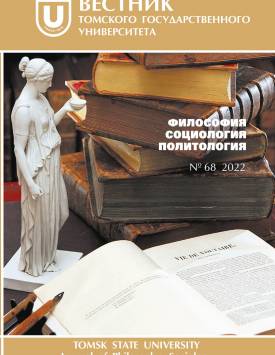Concept of the subject in the context of the computer simulation hypothesis
The article is a continuation of analyzing the skeptical problem of the external world in the context of the computer simulation hypothesis. The beginning was in the article “The Computer Simulation Hypothesis and the Problem of Skepticism”. The thinking is within the framework of a new version of the matrix/metaphysical hypothesis by David Chalmers. The skeptical problem is formulated and discussed in the form of two questions: 1. Can the subject know that he is in a simulation? 2. Can the simulated world be real? The hypothesis of computer simulation is skeptical if the statements of the subject in simulation about the external world are false. The author pays attention to the concept of the subject inside the simulated world and formulates two concepts. The first is a biological subject: a biological being that is connected to the simulation using a special device (contacts, wires, controllers, etc.). The biological subject is not a part of the simulation, but can only interact with it. The second concept is a digital subject: a simulated being, completely digital. The digital subject is a part of the simulation. These concepts are considered in the case of a perfect simulation that does not allow errors, glitches, etc., and an imperfect one that allows some errors. For the subject inside the simulation, it depends on whether he can know that the world around him is simulated or not. If the subject is inside a perfect simulation, then its program prescribes in advance whether he will be able to find evidence of this or not. Imperfect simulation assumes the possibility of errors and evidence that can be detected by the subject. If the subject is in a perfect simulation, he may never get proof of this, because her perfect program is written in such a way that the simulated world cannot be distinguished from the real one. As an answer to the question whether the simulated world can be considered real, the position of virtual realism and some arguments in its favor are given. The author comes to the conclusion that, firstly, the subject may know that he is in a simulation, if the simulation is imperfect. And secondly, from the point of virtual realism, for the subjects inside the simulation, regardless of whether they are biological or digital, the simulated world surrounding them will be real for them. The author declares no conflicts of interests.
Keywords
problem of external world, virtual reality, computer simulation hypothesis, virtual realismAuthors
| Name | Organization | |
| Sprukul’ Polina S. | Tomsk Scientific Center, Siberian Branch of the Russian Academy of Sciences; Tomsk State University | polina.sprukul@gmail.com |
References

Concept of the subject in the context of the computer simulation hypothesis | Tomsk State University Journal of Philosophy, Sociology and Political Science. 2022. № 68. DOI: 10.17223/1998863X/68/14
